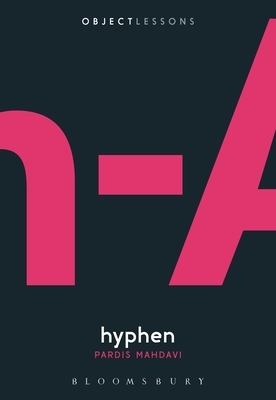
Hyphen
by Pardis Mahdavi
Genres: History, Memoir, Non-fictionPages: 160
Series: Object Lessons
Rating:

Synopsis:To hyphenate or not to hyphenate has been a central point of controversy since before the imprinting of the first Gutenberg Bible. And yet, the hyphen has persisted, bringing and bridging new words and concepts.
Hyphen follows the story of the hyphen from antiquity - Hyphen" is derived from an ancient Greek word meaning "to tie together" - to the present, but also uncovers the politics of the hyphen and the role it plays in creating identities. The journey of this humble piece of connective punctuation reveals the quiet power of an orthographic concept to speak to the travails of hyphenated individuals all over the world. Hyphen is ultimately a compelling story about the powerful ways that language and identity intertwine.
Mahdavi - herself a hyphenated Iranian-American - weaves in her own experiences struggling to find her own sense of self amidst feelings of betwixt and between. We meet six other individuals who are each on a similar journey and watch as they find a way to embrace the space of the hyphen - rejecting the false choice of trying to fit into previously prescribed identities. Through their stories, we collectively consider how belonging only serves to fulfill the failures of troubled states, regimes, or institutions and offer possibilities to navigate, articulate, and empower new identities.
Pardis Mahdavi’s take on the Object Lessons series, Hyphen, is part-informative, part-memoir, and it’s a format that works well. I still far prefer the books that focus in on the object in question, but this one alternates the two quite well, using the one to help to illuminate the other. It’s probably one that will make a different kind of sense to Americans, since a good portion of the discussion is about “hyphenated Americans” (a phrasing I haven’t heard before, but which apparently has a history), and it delves into the history around that.
Not that immigrants in other countries don’t have similar stories, but I’d also hesitate to generalise. There are certainly parallels with “hyphenated British” experience, and it’s certainly not better here, just different (though increasingly the same all over, I guess; thanks globalisation).
Anyway, Mahdavi’s take on the hyphen wasn’t perhaps the detailed history of punctuation that I might find fascinating (though I have read a book about hyphens before, if memory serves), but it was interesting.
Rating: 3/5

The first mention I know if of hyphenated-Americans is Teddy Roosevelt denouncing the practice: for him American identity was unitive and all-consuming. I imagine that’s mentioned here.
Yep, that was mentioned! New to me (given I’m Welsh, perhaps not too surprising).